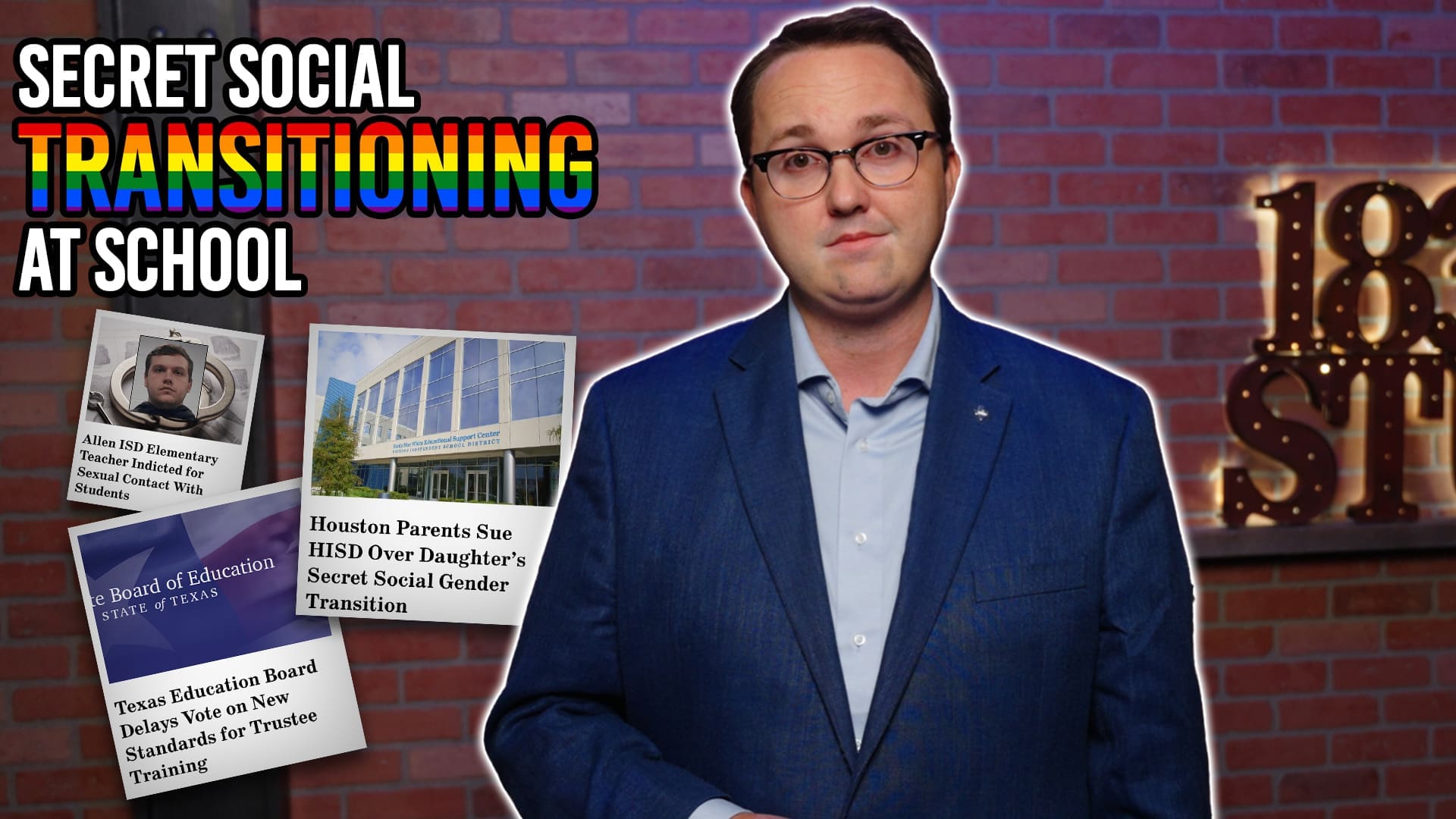Mr. McConaughey:
You have toyed with the idea of running for governor of Texas. I’m not sure that should be an entry-level position in government, but I wanted to offer my advice. If you want to be governor, or if you want to participate in policy discussions, I believe it is important that you know two things. First, you need to know how Texans feel about this issue. Second, you need to know more about the actual policies.
I listened to your televised remarks and read the column you published in the Austin American-Statesman after the school shooting in Uvalde, Texas.
I hope you agree that Texans of every political persuasion want our children to be safe. I believe people seeking stronger gun control laws generally believe they will keep people safer. Advocates of self-defense support fewer restrictions on law-abiding citizens owning and carrying guns because it will reduce violent crimes. As long as your motives are pure, we are on the same side here. If you are trying to take away people’s rights because you are afraid of guns, or concerned that your fellow citizens can’t be trusted with them, then we have nothing to talk about and you will never be fit to hold any office in this country.
You call for universal background checks. You should know that all gun dealers must conduct a background check for all retail gun sales, except for persons with handgun licenses proving the background check was already conducted. You should also know that criminals don’t buy guns from dealers or undergo background checks; they steal them or get them from relatives. The “gun show loophole” is the fact that federal law allows people to loan or borrow guns, or to give them as gifts to relatives and friends, without getting the government’s permission or committing a federal felony.
You want to prevent anyone under 21 from buying an “assault weapon” until he or she is 21 and sits out a waiting period. An “assault rifle” is a fully automatic gun that can generally only be possessed by police and military. An “assault weapon” is a fictitious term fabricated by politicians with the specific intent of causing the public to confuse machine guns with ordinary sporting rifles. There was no detectible benefit to the federal “assault weapon ban” and the ban on normal-capacity magazines that were in place from 1994 to 2004. This policy is proven to be ineffective.
Rifles are only used in a tiny minority of murders (2.1 percent, 297 out of 14,123, in 2019). Knives, body parts like fists, and clubs all take more lives.
You advocate for “red-flag laws.” A “red flag” is a specific fact (“red flag”) that provides credible advance warning of a person committing an act of violence. A “red-flag law” allows the government to prevent the person from committing the act, by taking a person’s guns, placing the person under a court order, committing a person to a mental institution, committing a person to jail or prison, or placing other restraints on the person’s liberties. Here are the state and federal red-flag laws that are in force in Texas.
Criminals:
- Felons: Federal law prohibits convicted felons from possessing guns or ammunition. 18 U.S.C. § 922(g)(1).
- Felons: Texas law prohibits convicted felons from possessing guns for five years from final release, and thereafter anywhere except the premises where they reside. Texas Penal Code § 46.04(a).
- Dishonorably discharged: Federal law prohibits persons who were dishonorably discharged (usually because they committed felony offenses) from the armed forces from possessing guns or ammunition. 18 U.S.C. § 922(g)(6).
- Fugitives from Justice: Federal law prohibits fugitives from justice from possessing guns or ammunition. 18 U.S.C. § 922(g)(2).
- Indictments: Federal law prohibits anyone charged with a felony from receiving, transporting, or shipping a firearm. 18 U.S.C. § 922(n).
- Bond conditions – assure attendance: Texas law allows a court to impose any reasonable condition to assure the accused’s attendance at trial, on a bail bond. Texas Code of Criminal Procedure Art. 17.15.
- Bond conditions – protect victim and public: Texas law allows a court to impose any reasonable condition relating to the safety of the victim or the community, on a bail bond. Texas Code of Criminal Procedure Art. 17.40.
Mental Health and Drugs:
- Drug users: Federal law prohibits illegal drug users or addicts from possessing guns or ammunition. 18 U.S.C. § 922(g)(3).
- Dangerous mental disorders: Federal law prohibits persons “adjudicated as mental defectives” or who have been committed to mental institutions from possessing guns or ammunition. 18 U.S.C. § 922(g)(4). This is a “red-flag” law specifically aimed at people who at one time were deemed dangerous to themselves or others because of a mental disorder.
- Dangerous mental disorders – civil commitment. Texas law allows civil commitment of persons with mental disorders that make them dangerous to themselves or others. Texas Health & Safety Code Chapter 574. This is a “red-flag” law specifically aimed at people who are dangerous to themselves or others because of a mental disorder. It is stronger because it confines them in jail.
- “Incapable of exercising sound judgment”: Persons who suffer from certain specific mental disorders are ineligible for LTC’s. Gov’t C. § 411.172(a)(7), (d), and (e).
Domestic Violence, Threats, etc.:
- Protective orders: Federal law prohibits persons subject to protective orders and a MUCH broader category of similar court orders from possessing guns or ammunition. 18 U.S.C. § 922(g)(8).
- Protective orders: Texas law automatically prohibits persons subject to protective orders from possessing firearms. Texas Penal Code § 46.04(c). They are also ineligible for an LTC. Gov’t C. § 411. 172(a)(12).
- Protective orders: The Texas Family Code authorizes protective orders, which can explicitly prohibit gun possession while in effect. Texas Family Code Chapter 85.
- Peace bonds: Texas law authorizes “peace bonds,” authorizing a court to jail a person “who has threatened to commit an offense” or is likely to commit an offense or force him or her to post a bond. This means you can go to jail if the government predicts you might commit a future crime, like the movie Minority Report. Texas Code of Criminal Procedure Chapter 7. This is a “red-flag” law aimed at persons intending to commit crimes, without mental disorders. It is stronger than “red-flag” laws because it puts them in jail.
- Magistrate’s protective orders: The Texas Code of Criminal Procedure authorizes magistrate’s protective orders for up to 60 days, which prohibit gun possession while in effect. Texas Code of Criminal Procedure Art. 17.292(c)(4) and (g).
- Misdemeanor family and dating violence: Federal law prohibits persons convicted of misdemeanor crimes of domestic violence from possessing guns or ammunition, for life. 18 U.S.C. § 922(g)(9). The definition of “family violence” includes threats. The statute now extends these protections to “dating violence.” Note that the Supreme Court has ignored the actual law and extended this to nonviolent “assaults by touch,” and to unintentional (reckless) assaults.
- Family violence: Texas law prohibits persons convicted of misdemeanor assault against a family member from possessing guns for five years from final release. Texas Penal Code § 46.04(b).
- Sexually violent predators – civil commitment. Texas law allows civil commitment of sexually violent predators. Texas Health & Safety Code Chapter 841.
- Assault: Texas law makes “assault” (and related offenses like sexual assault and aggravated assault) a crime. A violation may be a misdemeanor or felony, punishable by a fine and/or confinement. Penal C. § 22.01.
- Deadly conduct: Texas law makes it a crime to recklessly place another in imminent danger of serious bodily injury, including pointing a gun at a person, home, building, or vehicle. A violation may be a misdemeanor or felony, punishable by a fine and/or confinement. Penal C. § 22.05.
- Terroristic Threat: Texas law makes it a crime to threaten to commit any offense involving violence. A violation may be a misdemeanor or felony, punishable by a fine and/or confinement. Penal C. § 22.07.
- Violation of protective order or Bond Condition: Texas law makes it a crime to violate a bond condition or protective order intended to protect a victim or the community. A violation may be a misdemeanor or felony, punishable by a fine and/or confinement. Penal C. § 25.07.
- Continuous family violence: Texas law makes it a crime to commit family violence two or more times in a 12-month period. A violation is a third degree felony. Penal C. § 25.11.
- Disorderly conduct: Texas law makes it a crime to use abusive, indecent, profane, or vulgar language in public and incite a breach of the peace, to abuse or threaten a person in an offensive manner, discharge a firearm in public, display a firearm or weapon in a manner calculated to alarm, or discharge a firearm across a public road. Penal C. § 42.01. A charge or conviction can disqualify a person from an LTC. Gov’t C § 411.172(a)(4) and (8). Discharging a gun in a city of over 100,000 people is a Class A Misdemeanor. Penal C. § 42.12.
- Harassment: Texas law makes it a crime to “harass” another person, including threatening injury, and certain types of repeated communications. A violation is a Class B or A Misdemeanor, punishable by six months or a year in jail and a fine. Penal C. § 42.07.
- Stalking: Texas law makes it a crime to “stalk” another person, which includes certain threats to the person or members of his or her family or household. A violation is a felony. Penal C. § 42.072.
Others:
- Aliens: Federal law prohibits illegal aliens and persons with nonimmigrant visas from possessing guns or ammunition. 18 U.S.C. § 922(g)(5).
- Renounced citizenship: Federal law prohibits persons who renounced their citizenship from possessing guns or ammunition. 18 U.S.C. § 922(g)(7).
- License to Carry a Handgun – ineligibility: The Texas license to carry law prohibits categories of persons from obtaining a license. Texas Gov’t Code § 411.172.
- License to Carry a Handgun – suspension and revocation: The Texas license to carry law allows a license to be suspended or revoked if a person commits a crime, becomes subject to a protective order, or becomes otherwise ineligible. Texas Gov’t Code § 411.180.
Please take a look at these existing red-flag laws. Before proposing ANOTHER red-flag law, you need to 1) Identify a loophole that is NOT covered by any of the existing laws, then 2) Explain how your proposal will close that loophole. If you can’t answer those question, then you have no business trying to take away more of our freedoms.
If the person committed a crime, the remedy is jail or prison. If the person made a threat, there are abundant methods of restraining or jailing the person. If the person is dangerous because of a mental disorder, then taking his guns is NOT ENOUGH. He needs to be picked up, committed to a place where he has no access to guns, cars, knives, garden tools, matches, gasoline, or anything else dangerous, then treated for the disorder. If you can’t justify that intervention, then maybe you should think twice before taking away his right to defend himself and his family.
The right to keep and bear arms is specifically enumerated in the Bill of Rights. A politician’s desire to disarm you is not sufficient cause. A vague accusation that someone thinks you might do a bad thing is not sufficient. The government cannot impose a prior restraint on your right to self-defense unless there are specific circumstances that demonstrate you represent a clear and present danger to yourself or someone else.
I’ve always enjoyed your movies, but movies are generally fiction. You are wanting to take the idea from Tom Cruise’s movie “Minority Report” and make it law. We do NOT need a PreCrime Unit with the power to arrest people before they commit crimes. This is one concept that needs to be left in the movies.
Mr. McConaughey, if you entertain any thought of representing any Texans in any capacity, you need to support freedom. Until you can represent our views and understand the policies, you have no business lecturing us. And running for governor is off the table.
This is a commentary published with the author’s permission. If you wish to submit a commentary to Texas Scorecard, please submit your article to submission@texasscorecard.com.





